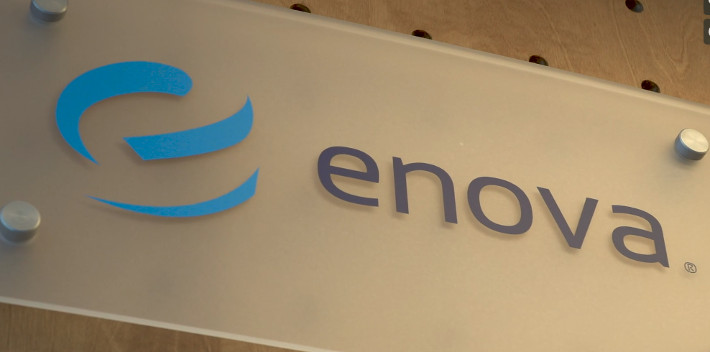Business Lending
Outside the Box: Idea Financial’s Unusual Path to Alternative Finance
August 28, 2019
How many lawyers does it take to start up an alternative finance company? Two, according to Idea Financial’s Co-founders, Justin Leto and Larry Bassuk.
Idea, a Miami-based company which offers lines of credit to SMB owners, is the product of Leto and Bassuk’s partnership over the course of years, the latter told deBanked. “We took a leap of faith and left our practices and we began developing this business out of the conference room of our own firm.” But before that, the pair worked together as both lawyers and entrepreneurs.
Beginning in 2011, they met when Leto was already running his own practice and Bassuk was working as an associate for a different firm on the same floor. What started as a chance meeting developed into talks of what’s missing from their industry, which ultimately led to their early ventures together: their own legal firm, Leto | Bassuk, and Level Insurance.
While the former of these is no longer operating, due to their focus shifting to Idea, Level is still providing services to those looking for a niche form of insurance. Established in 2016, the company offers Litigation Cost Protection which covers those lawyers who work on contingency, this being the agreement of them being paid a percentage of the assets they recover for the client, thus earning nothing if the client loses.
Born from Leto and Bassuk’s own experiences as attorneys, Level Insurance provided that initial entrepreneurial step outside of a law firm. And while it afforded the comfort of overlapping with the legal industry, their decision to go into alternative finance brought with it a new marketplace as well as new challenges.
Although it was founded in March 2017, Idea Financial’s first year in business was largely spent working out of Leto | Bassuk’s conference room, figuring out strategies, technology, and credit models; as well as making key hires and developing their product. In fact, it wasn’t until January of 2018 that Idea made their first loan. Initially backed with $20 million by Warsaw-based Idea Bank, which specializes in servicing small businesses, Idea Financial has since secured another $70 million from the fintech bank, Cross River Bank, and has funded $50 million to nearly six hundred businesses.
Now at 35 employees and with a new office beyond the walls of the old conference room, Leto asserts business is going well despite the odds having been stacked against them. “Some would have called [Idea Bank] crazy because they gave two people who were from outside the space this kind of money to build a business and lend money without any strict covenants. So, Larry and I were left to make our own rules.”
And looking forward, Bassuk is confident of their future, lauding much of the company’s strength to the diversity of their workforce, with recruits from Montenegro, Russia, Colombia, and Venezuela, and their unique backgrounds. “We’re all about recruiting top talent, all about diversity of thought.”
“We’re not from the finance space, we’re not from the alternative lending space either, we came at this opportunity with a different approach.”
IOU Financial Originates $38.5M in Q2
August 26, 2019IOU Financial originated $38.5M in loans in Q2, up from $32.8M the quarter before. The company said that the figure was actually a 31.8% increase over Q2 2018.
In a press release, IOU CEO Phil Marleau said, “IOU delivered strong loan origination and revenue growth in the second quarter of 2019 and continued to post positive earnings. We remain committed to our strategy of profitable growth which continues to deliver consistent and favorable results since its implementation.”
IOU is traded on the Toronto Stock Exchange and has a market cap of $19.3M.
Calls For Oversight As SBA Loans Go To Wall Street, Investor Funds, And High End Businesses In Beverly Hills
August 20, 2019 In a report released this month by OpenTheBooks.com, a non-partisan non-profit organization, outlined how and who the SBA had guaranteed loans for in the years between 2014 and 2018. Covering various forms of funding, ranging from 7(a)s to 504s to surety bond guarantees, the report details a number of different types of businesses as well as locations that the SBA guaranteed loans for across all 50 states.
In a report released this month by OpenTheBooks.com, a non-partisan non-profit organization, outlined how and who the SBA had guaranteed loans for in the years between 2014 and 2018. Covering various forms of funding, ranging from 7(a)s to 504s to surety bond guarantees, the report details a number of different types of businesses as well as locations that the SBA guaranteed loans for across all 50 states.
Running through the document is a criticism of the channels through which the loans are processed, as questions are raised over whether those receiving financing actually require the funds. Largely being businesses that provide luxury goods and services, the report puts forth five questions that “the public should be asking”: how were these industries and subsidies chosen? Why should non-upper-class citizens subsidize these businesses? Why is the SBA lending so much via +$1 million loans during a period of unprecedented economic prosperity? Why is the SBA lending to Wall Street bankers? And is the SBA qualified to make determinations of which business to favor over another when approving loans?
Such questions stem from the analysis that follows them in the report. Herein, it is revealed that the SBA obligated and awarded $168.9 billion in loans and insurance guarantees, and that small businesses in Beverly Hills, specifically, received $117 million of this; while $12.2 billion flowed to Wall Street’s venture capital firms, mezzanine finance firms, private investor funds, and investment pools; and $280 million went to private country clubs. SBA reports indicate that $1 of every $14 loaned goes to just 300 companies out of the total 543,081 recipients of SBA funding, with this group, dubbed ‘The Fortunate 300,’ receiving $12 billion. As well as these figures, the report reveals that the SBA charged off $16.5 billion from 2010 to 2018, and that there has been a 52% increase in lending between 2014 and 2018, with a 36% increase in loans of $1 million or more, specifically.
 Of particular note are the sections devoted to 7(a) and 504 loans, these being the most common types of financing discussed in the document, with there being 303,363 recipients of the former and 29,210 of the latter. Outlined here are the top loan recipients of each type as well as the amounts received.
Of particular note are the sections devoted to 7(a) and 504 loans, these being the most common types of financing discussed in the document, with there being 303,363 recipients of the former and 29,210 of the latter. Outlined here are the top loan recipients of each type as well as the amounts received.
Displaying a wide-ranging portfolio, the top 50 7(a) loan recipients include a nationally recognized childcare program, a family owned producer and exporter of grain, and an aircraft spare parts distribution and repair service; with these receiving over $44 million, $25 million, and $19 million, respectively. Singled out in this section are plastic surgery clinics. With 115 individual clinics receiving $50.9 million between 2010 and 2018, the report draws attention to why such upper class and profitable businesses are requiring loans in the millions.
Similarly, the list of top recipients of 504 loans also feature a range of funding up to $45 million. What differed is that the top 50 504 recipients list is comprised of much more businesses in the hospitality sector, with Holiday Inn and Home2 Suites taking first and second place. However, the report again questions the allocation of funding to such businesses that are nationally successful, note that the purpose of 504s is to expand one’s company.
As well as these questions over loan allocations, the report serves to highlight another development within funding, this being the surge in disaster lending between 2014 and 2018 – a shift that perhaps reflects the increase in destructive weather that climate change has brought. According to the SBA, it has increased its approval of disaster assistance loans by 1,633%, with the number of loans jumping from 6,244 ($426 million) to 140,249 ($7.3 billion) in five years. Interestingly, the average loan value dropped from $68,326 to $52,726 in these years.
Enova’s Small Business Division Garner’s Limelight in Q2
August 16, 2019 Late last month, Enova released its second quarter report for 2019. Generally bearing positive news, the report asserts that the company is in a good position due to increasing demand, growth in various areas, and reductions in financing costs.
Late last month, Enova released its second quarter report for 2019. Generally bearing positive news, the report asserts that the company is in a good position due to increasing demand, growth in various areas, and reductions in financing costs.
Total revenue is up from Q2 2018, rising 13% from $253 million to $286 million, just as net income has risen from $18 million to $25 million.
“We are pleased to report another quarter of solid financial results that exceeded our expectations on both the top and bottom line,” said Enova CEO David Fisher in the earnings call. “Our strong financial performance was driven by solid demand, stable credit, and efficient marketing spend. We continue to demonstrate our ability to produce sustainable and profitable growth and our second quarter results further validate this balanced approach.”
Speaking more specifically about which divisions of Enova have excelled, Fisher highlighted the small business sector, which is composed of Headway Capital and The Business Backer. “NetCredit and our small business financing products were the primary growth drivers during Q2, with domestic revenue up 19% year over year … Our products are clearly gaining traction with customers, resulting in originations increasing 140% year over year, and small business now represents 12% of our book at the end of Q2.”
Jim Granat, Enova’s Head of Small Business Financing, chalked such gains up to “having a great team, a good strategy, and a great company behind us that has the ability to invest in the analytics, tech, and people.” The strategy he speaks of is titled ‘Faster and Easier,’ a modus operandi began by him after his arrival to the company in 2018. It is data-driven and involves incorporating certain individual operations of Headway and Business Backer, and streamlining these processes so that the brands overlap for particular actions. Implemented with the belief that “doing it internally would lead to speed and ease externally,” ‘Faster and Easier’ appears to be working, if one takes Fisher’s comments and the report as affirmation.
“We’ve been working really hard and hopefully the results of that show in the fruits of these efforts,” said Granat. “We are just in the beginning of what we can accomplish, these projects take a while and we are incredibly excited about the second half of 2019, let alone 2020 and beyond.”
The 2019 Top Small Business Funders By Revenue
August 14, 2019The below chart ranks several companies in the non-bank small business financing space by revenue over the last 5 years. The data is primarily drawn from reports submitted to the Inc. 5000 list, public earnings statements, or published media reports. It is not comprehensive. Companies for which no data is publicly available are excluded. Want to add your figures? Email Sean@debanked.com
| Company | 2018 | 2017 | 2016 | 2015 | 2014 |
| Square | $3,298,177,000 | $2,214,253,000 | $1,708,721,000 | $1,267,118,000 | $850,192,000 |
| OnDeck | $398,376,000 | $350,950,000 | $291,300,000 | $254,700,000 | $158,100,000 |
| Kabbage | $200,000,000+* | $171,784,000 | $97,461,712 | $40,193,000 | |
| Global Lending Services | $232,200,000 | $125,700,000 | |||
| Bankers Healthcare Group | $220,300,000 | $160,300,000 | $93,825,129 | ||
| National Funding | $121,300,000 | $94,500,000 | $75,693,096 | $59,075,878 | $39,048,959 |
| Forward Financing | $75,500,000 | $42,100,000 | $28,305,078 | ||
| ApplePie Capital | $69,700,000 | ||||
| Fora Financial | $68,600,000 | $50,800,000 | $41,590,720 | $33,974,000 | $26,932,581 |
| Reliant Funding | $64,800,000 | $55,400,000 | $51,946,000 | $11,294,044 | $9,723,924 |
| Envision Capital Group | $32,700,000 | ||||
| Expansion Capital Group | $31,300,300 | $23,400,000 | |||
| SmartBiz Loans | $23,600,000 | ||||
| 1 Global Capital | bankruptcy | $22,600,000 | |||
| IOU Financial | $19,200,000 | $17,415,096 | $17,400,527 | $11,971,148 | $6,160,017 |
| Quicksilver Capital | $16,500,000 | ||||
| Channel Partners Capital | $23,000,000 | $14,500,000 | $2,207,927 | $4,013,608 | |
| Lendr | $16,500,000 | $11,800,000 | |||
| Lighter Capital | $16,000,000 | $11,900,000 | $6,364,417 | $4,364,907 | |
| United Capital Source | $9,735,350 | $8,465,260 | $3,917,193 | ||
| Fundera | $15,600,000 | $8,800,000 | |||
| US Business Funding | $14,800,000 | $9,100,000 | $5,794,936 | ||
| Wellen Capital | $12,200,000 | $13,200,000 | $15,984,688 | ||
| PIRS Capital | $11,900,000 | ||||
| Nav | $10,300,000 | $5,900,000 | $2,663,344 | ||
| P2Binvestor | $10,000,000 | ||||
| Seek Business Capital | $8,800,000 | ||||
| Fund&Grow | $7,500,000 | $5,700,000 | $4,082,130 | ||
| Funding Merchant Source | $7,500,000 | ||||
| Shore Funding Solutions | $5,000,000 | $4,300,000 | |||
| StreetShares | $4,967,426 | $3,701,210 | $647,119 | $239,593 | |
| FitSmallBusiness.com | $3,000,000 | ||||
| Eagle Business Credit | $3,600,000 | $2,600,000 | |||
| Everlasting Capital | $2,500,000 | $2,100,000 | |||
| Swift Capital | acquired by PayPal | $88,600,000 | $51,400,000 | $27,540,900 | |
| Blue Bridge Financial | $6,569,714 | $5,470,564 | |||
| Fast Capital 360 | $6,264,924 | ||||
| Cashbloom | $5,404,123 | $4,804,112 | $3,941,819 | ||
| Priority Funding Solutions | $2,599,931 |
Funding Circle Originated $377M of US Loans in First Two Quarters of 2019
August 8, 2019Funding Circle originated $377M of loans in the US in the first six months of 2019, according to their latest public report. The company said that “growth was proactively controlled” and that they tightened higher risk band lending and increased prices. They’ve now loaned more than $2B cumulatively in the US since inception and their growth is being led by “new borrowers” that are being lured away from traditional lenders.
Funding Circle still lags behind PayPal, OnDeck, Kabbage, Square Capital, and Amazon in the US in loan origination volume, according to the deBanked small business finance rankings. Its closest competitors by volume are BlueVine, National Funding, and Kapitus.
Funding Circle Co-Founder & Managing Director James Meekings to Step Down
August 8, 2019 Funding Circle’s lackluster business performance has led to a casualty. Co-founder James Meekings, who serves as Managing Director of the UK Business (the company’s primary market), will be transitioning to a non-executive role on the UK board in Q3. He will no longer be MD, the company announced.
Funding Circle’s lackluster business performance has led to a casualty. Co-founder James Meekings, who serves as Managing Director of the UK Business (the company’s primary market), will be transitioning to a non-executive role on the UK board in Q3. He will no longer be MD, the company announced.
Lisa Jacobs, Funding Circle’s Chief Strategy Officer, will take over leadership of the UK business, the company subsequently disclosed.
Funding Circle went public less than 1 year ago on the London Stock Exchange. Since then the share price has plummeted by 75%.
The company has been busy trying to correct course through various maneuvers, one of which has been to cut CEO Samir Desai’s annual compensation.
Michele Romanow on Clearbanc’s Recent $300M Series B
August 7, 2019 Last week Clearbanc announced it had secured $300 million in a Series B. Specializing in the provision of capital to business owners for the purchasing of ads on digital platforms such as Facebook and Instagram, the company operates in an untapped niche. Alternative financing for the acquirement of a highly specific product, this product being the form of advertising that is currently most wide-spread.
Last week Clearbanc announced it had secured $300 million in a Series B. Specializing in the provision of capital to business owners for the purchasing of ads on digital platforms such as Facebook and Instagram, the company operates in an untapped niche. Alternative financing for the acquirement of a highly specific product, this product being the form of advertising that is currently most wide-spread.
And perhaps this is why the Toronto-based company received an investment of such magnitude for their second round of funding. The signs of success are there: high demand; low supply; and as well as this, there’s a celebrity profile attached to Clearbanc, Dragons’ Den’s Michele Romanow.
Having co-founded the company in 2015, Romanow now acts as its President. Speaking to deBanked recently, the celebrity investor explained how Clearbanc works as well as the what it does differently.
Ultimately, it comes down to two intertwined strategies: focusing on unit economics and having good tech.
“Our core is really understanding what your customer acquiring cost and your product costs are, as well as if you’re making money on each transaction,” explains Romanow. Speaking in straight forward calculations, the dragon states that, at a basic level, Clearbanc will check and find that if it takes $10 to make a product, $10 to buy Facebook ads, and that this leads to $50 in sales, then you have positive unit economics. And that this sort of calculation is what their tech does, just on a much more complex scale.
“We built a machine learning model on a fundamental understanding of what the unit economics of a business were.” A range of financial information is plugged in, “thousands of factors” are accounted for, and an algorithmically approved recommendation is prepared for underwriters.
 Such reliance on tech and number-crunching has produced an unexpected side-effect for Clearbanc. Strict adherence to positive and negative numerical values has steamrolled two potential biases encountered in the finance raising process: location and gender. Romanow jokes about a report showing that just four states received 80% of venture capital in 2018, and nine raised nothing at all, saying that “it’s impossible that there’d be no good entrepreneurs in nine states of America.” Which is partly why Clearbanc has invested in 43 out of 50 so far, each business being greenlighted by their tech. As well as this, the company has funded eight times more women-led businesses than the industry average for venture capital.
Such reliance on tech and number-crunching has produced an unexpected side-effect for Clearbanc. Strict adherence to positive and negative numerical values has steamrolled two potential biases encountered in the finance raising process: location and gender. Romanow jokes about a report showing that just four states received 80% of venture capital in 2018, and nine raised nothing at all, saying that “it’s impossible that there’d be no good entrepreneurs in nine states of America.” Which is partly why Clearbanc has invested in 43 out of 50 so far, each business being greenlighted by their tech. As well as this, the company has funded eight times more women-led businesses than the industry average for venture capital.
Surprising results aside, Romanow claims that much of her recent ventures are inspired by her time with Dragons’ Den, with the concept for Clearbanc partially stemming from her reflections on the format of the show.
Specifically, the idea struck her after seeing a number of business owners pitch themselves for funding in exchange for equity, when what they were receiving was not worth pawning off part of their company. Believing that a better deal existed, Clearbanc was created with the plan to operate via revenue share agreements, taking a percentage of revenue over an undetermined amount of time until a fixed cost is paid.
As well as this, Clearbanc offers business owners access to its Venture Partner Network, a team of successful investors and high profile entrepreneurs that will offer guidance. Included are the likes of Jason Finger of Seamless, Jack Abraham of Hims, Gary Vaynerchuck, and Romanow herself. Sharing similarities with the setup of Dragons’ Den, in which celebrity investors offer funding and guidance, it seems like Romanow is carrying her experiences along with her.
As to where else she might carry them, Clearbanc is looking to eventually expand. “We’re experimenting in a couple of international territories right now, but we’ll have some announcement about that probably later this year,” she explains tightlippedly. For now she’ll continue to work with tech in North America with the belief that it’s the way forward, “when we use data better, we can drive down prices for everyone. And I think that’s an important part of what the equation is.”





























